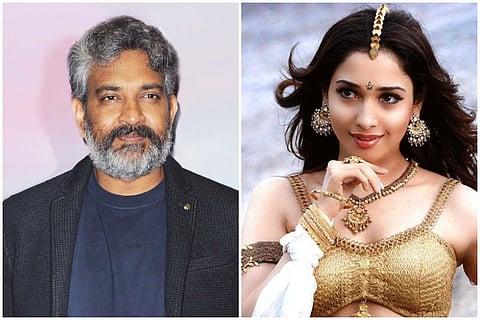

SS Rajamouli, director of the Baahubali films, was recently at the Harvard India Conference 2019 where he was interviewed by TNM’s editor-in-chief Dhanya Rajendran. The Baahubali films, apart from being hugely successful commercially and raking in US $ 370 million, also established that films made in languages other than Hindi can be considered pan-Indian too.
In this conversation, Rajamouli speaks about making the Baahubali films, the criticism he has received, RRR and more. Excerpts below:
A lot of people believe the Baahubali films have made south Indian filmmakers dream bigger. How do you feel about heralding the change?
I can’t take credit for that. Once in a while there will always be a filmmaker who will think big. Sometimes there will be a precedence, sometimes not. Baahubali might give some people the confidence to think big, but not everyone who thinks big can make a big film. I myself don’t know if I can make a big film. It’s a dream and you just go ahead with it with your conviction.
But doesn’t regional cinema have certain boundaries? Or are these in the mind of the filmmakers?
Practical boundaries will always exist. The networks, the distribution system that is used to a certain way of functioning for a long time, would not think of letting everyone into the system. But that’s a physical hurdle that you have to cross, which is not too hard. The real hurdle is in your brain. I work on human emotions and I feel they are the same across any language, any culture.
Baahubali was a massive hit across India and there was a lot of pressure on how Baahubali 2 would turn out. What were the mental barriers you had in making the second film?
For us, Baahubali 2 was not an afterthought. It wasn’t like we thought let’s use this (success of Baahubali) to make another film. It is one story. Because we could not fit a 5-hour film into one part, we divided it into 2 parts. If we wanted, we could have made a Baahubali 3 which would have been easier to do, but we did not. The story is over with Baahubali 2, we don’t have anything left.
Is there pressure on you now to make pan-Indian films and not restrict yourself to the Telugu audience?
No. Filmmaking is never a pressure to me, whatever film I make. The pressure comes at the end of the film, as it’s about to release – whether it’s going to become a hit or not. Conceiving the story is the best part. There is no pressure, every moment is beautiful as the scenes fall into place. It’s like a jigsaw puzzle. It’s a pleasure, and at that time I don’t think about how I’m going to market it, which part of the country will watch it.
You’re making RRR with two superstars in Telugu. Will this also be a pan-Indian film?
It is a pan-Indian film, the nature of the story is like that. It will be a large-scale movie. Please don’t ask me anything else about RRR!
There’s been a lot of conversation on how women are represented in cinema. Your film attracted criticism for Avantika’s character, and there’s Vikramarkudu which has a hero obsessed with the heroine’s navel. What do you think of such portrayals? Would you do them differently now?
Initially when the criticism about Avantika came through, I was deeply pained. I was very angry and gradually I thought ok, all kinds of people exist, it doesn’t matter. For me the creation of Avantika, the song, is a beautiful piece of art. When the criticism started coming in, people started finding something wrong with the story. It was completely twisted out of context. Would I change anything in the character of Avantika if I was making Baahubali again today? Not even a single frame. I’m very proud of the art that I made.
There was another panel today on whether cinema can break caste barriers in India. One of the filmmakers actually said that your movies keep the status quo, with respect to the varna system. Do you believe you should start looking at cinema from different perspectives?
When I tell a story, I tell a story that excites me. I should feel nice about telling the story, I should emote. Today there’s a Me Too movement and if someone feels emotional about it and wants to tell that story, they should go ahead and make it. You can’t expect every storyteller to pick a subject that you like.
You can watch the full interview here: